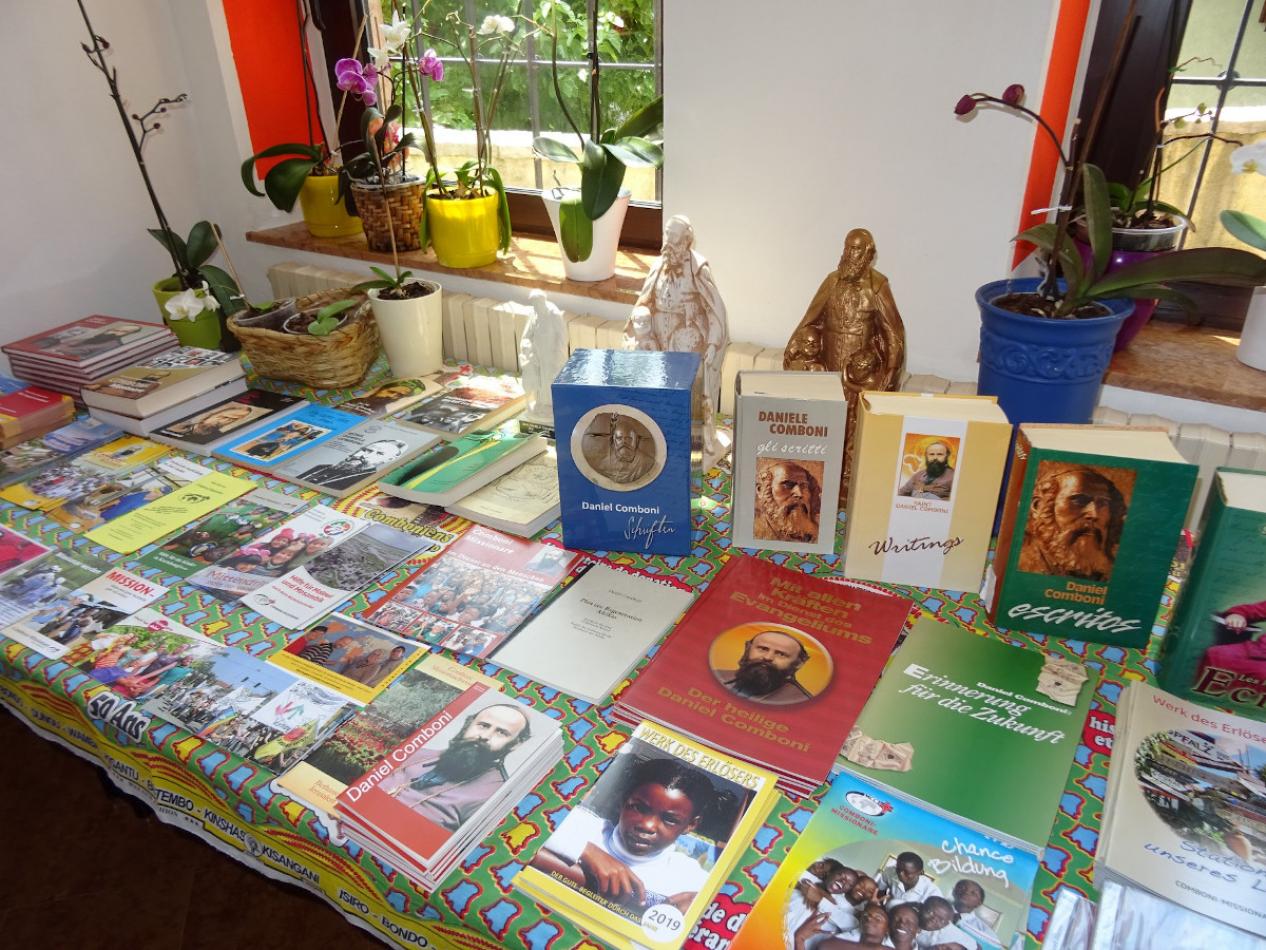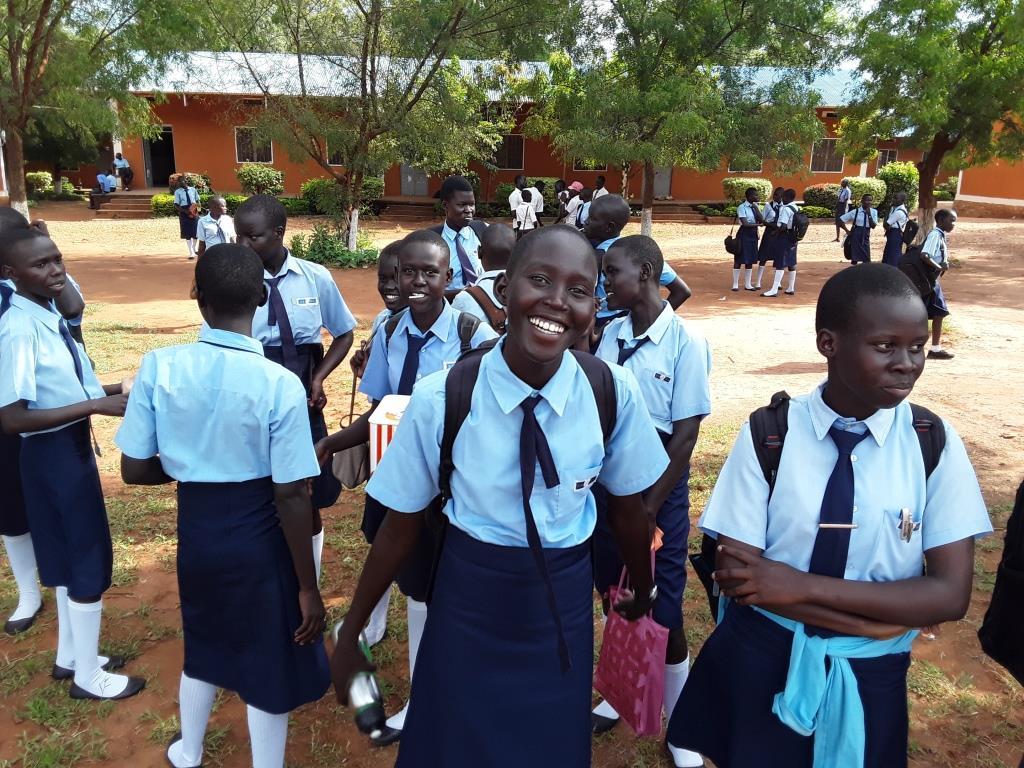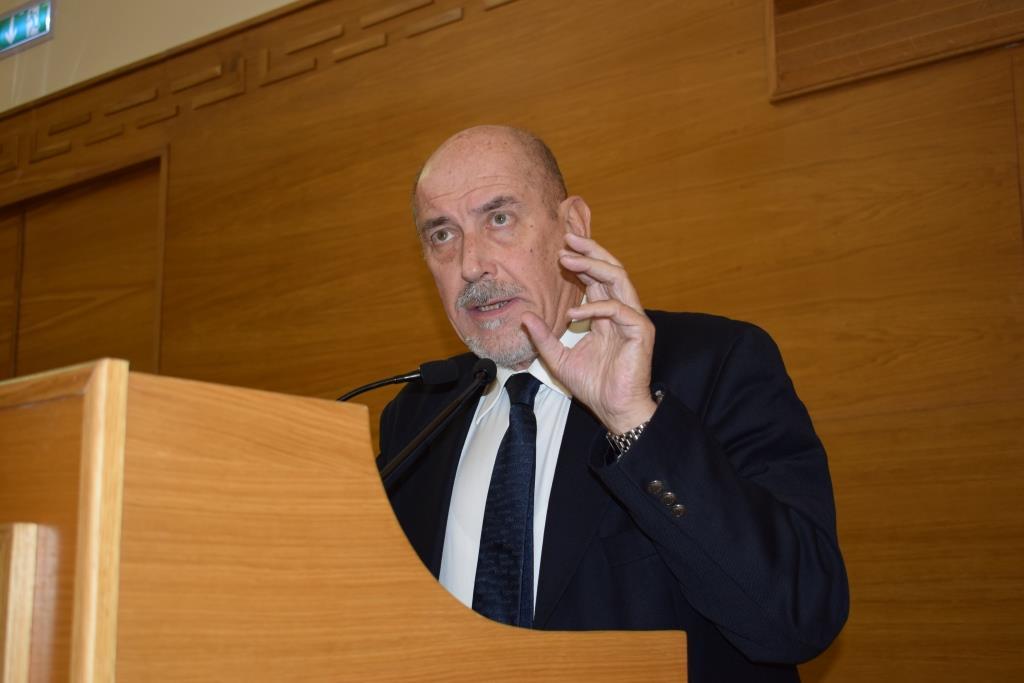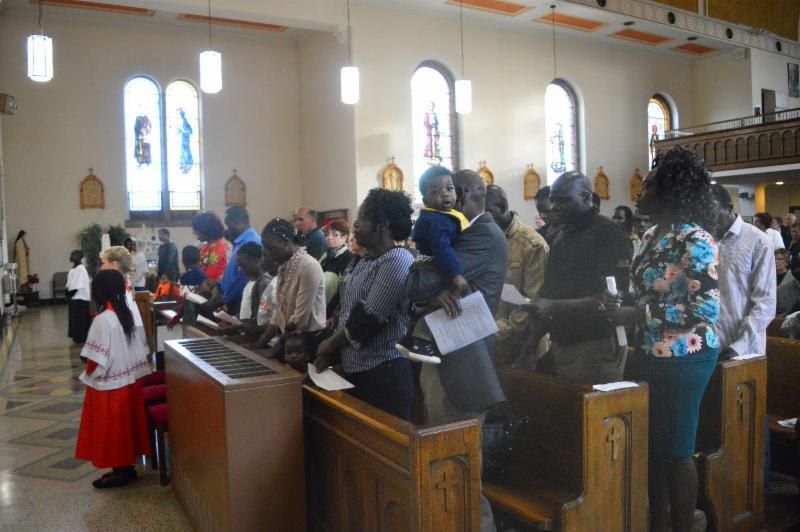Daniel Comboni
Comboni Missionaries
Institutional area
Other links
Newsletter
15 March 1831 – 15 March 2021
As we celebrate the 190th anniversary of the birth of Daniel Comboni (Limone Sul Garda, 15 March 1831) and the 140th anniversary of his death (Khartoum, 10 October 1881), we are invited to celebrate our charismatic memorial and to invoke the presence of the Spirit which illumined his life from birth to death. (…)
15 March 2021
190th Anniversary of the birth of St Daniel Comboni
« I have come to bring fire to the earth and how I wish it were blazing already! »
(Lk 12,49)
Keeping the flame alive
Introduction
As we celebrate the 190th anniversary of the birth of Daniel Comboni (Limone Sul Garda, 15 March 1831) and the 140th anniversary of his death (Khartoum, 10 October 1881), we are invited to celebrate our charismatic memorial and to invoke the presence of the Spirit which illumined his life from birth to death. His beatification (17 March 1996), whose 25th anniversary recurs this year, was a charismatic gift for the entire Comboni Family. On that occasion, ([1]), the general councils published a message together with a letter to encourage the members of our missionary family to be joyful and to gaze in spiritual manner at our father, seeking inspiration and fruitfulness for our missionary service. Finally, with the canonisation, the Church enrolled him in the register of saints, recognising the validity and relevance of the Comboni missionary charism and proposing St Daniel Comboni as a model of Christian life and mission, the example and paradigm of universal missionary commitment, which unites different continents and people in the passion for God and Humanity. Then too, our general councils gifted us with a message ([2]) and a letter ([3]) inviting us to look upon St Daniel as the witness and master of that sanctity to which we are called and the mission we live. This letter is part of this movement of the memorial and actualisation of the charismatic gift entrusted to St Daniel and, in him, to all of us: a gift from God that is revived in every Comboni generation.
Considering his roots. The memorial we keep of the birth of St Daniel Comboni invites us, before all else, to consider the family, ecclesial and social roots that influenced him so much and which he often mentioned ([4]). His birth occurred amid difficulties and limitations. His parents were migrants, having come to Limone looking for work. His father, Luigi Comboni had, at the age of fifteen, come to Limone from Bogliaco in December 1818. His mother, Domenica Pace, was born in Limone (31 March 1801) but her family was from Magasa, in the mountains. Luigi and Domenica married on 21 July 1826, in the church of St Benedict and, according to the baptismal register, had six children; to these we may also add twins who died and were not baptised ([5]).
“Daniel Comboni grew up with his parents in their modest house in Tesol, sharing the joys and sorrows of the family. Of all his siblings, only Vigilio (1827-1848) and Marianna (1832-1836) survived” ([6]). He had great affection and esteem for his mother and father. His mother died on 14 July 1858, during his first journey to Africa, and it was with his father Luigi that Daniel kept up constant correspondence in which he recognised the religiosity of his parents and the influence they had on his missionary life and vocation. Contained in those letters are the human and Christian elements that constituted the fertile soil that gave growth to the vocation and mission of St Daniel (the memory of the beauty of the lake and the mountains, pride in Christian faith and life, devotion to the Cross and the Saviour, the contemplation of his love and Pierced Heart, the passion for God and the most needy): “Have courage therefore, my dear father. I have always opened my heart to you, I speak to you every day, I am aware of your worries and I am enjoying a foretaste of the delights God has reserved for you in heaven. Courage therefore! May God be the centre of communication between us. May he guide our undertakings, our affairs, our destiny and let us rejoice that we are dealing with a good master, a faithful friend and a loving father” ([7]). The celebration of the 190th anniversary of his birth gives us a new opportunity to come closer to him and his family and ecclesial roots, strengthening awareness of our own roots as a spiritual background that gives stability to our personalities and spiritual fecundity to our missionary life. This celebration also gives us an opportunity, as the Comboni Family, to deepen the role of Limone and to continue the collaboration undertaken at the birthplace of St Daniel Comboni.
Faithfulness in the midst of adversity. The memorial of the 140th anniversary of the death of Daniel Comboni invites us to look at his life from the viewpoint of the supreme moment of his gift of himself for the regeneration of Nigrizia. In the letters he wrote during the last months of his life, he appears to be a missionary surrounded by difficulties but rooted in the faith: famine, plague and hunger, the lack of water, the scarcity of means to keep the missionary work going, the sickness and death of his missionaries … In his own words, those were “times of desolation” when “the sufferings to be alleviated are unfortunately too many” ([8]).
Faced with such difficulties, Comboni remains anchored in faith in God and the missionary vision that inspired and sustained his life. “I am happy in the cross which, when borne willingly out of love for God, gives birth to victory and eternal life”: these words ([9]) sum up, at a crucial moment, the mindset of his whole life. His return to the foot of the Cross, to the contemplation of the Pierced Heart where it all began, fills with light and courage the moment of his return to the Father and lies at the origin of the confidence and “courage for the present and even more for the future” ([10]) that Comboni instils in his missionaries in the moment of A-Dio: “I die but my work will not die!” ([11]).
The two dates of the memorial we keep this year mark out a life’s journey in which the power of the Spirit takes shape in the life of St Daniel and renders perceptible and alive a small patch “of the unlimited love” of God ([12]); he lets himself be “formed” by the Love he contemplates, keeping his gaze fixed on Jesus crucified. St Daniel leaves us a testimony that generates life for our time.
Birth and death. We are celebrating these anniversaries of the life of St Daniel Comboni after a year, 2020, that was marked by the coronavirus pandemic and after having begun the year 2021 while the whole world is still experiencing uncertainty in public health and the economy. In the Comboni Family, we too are suffering the consequences of this situation: we have lost men and women missionaries who, after many years of mission, enriched us with their testimonies and hoped to live out their old age in peace ([13]); the pace of our activities has been brought to a halt and our plans and projects have been suspended; the limits placed on our travelling has sorely tried us, challenging us to be creatively close to the poorest and the least and those most affected by the pandemic; we feel unable to find a way out and we share the feeling of disorientation and loss that is overpowering many of our brothers and sisters.
Seeing Daniel Comboni and in the span of his missionary life and vocation, from birth to death, we understand how, in the moment of crisis and uncertainty, he recognised and awaited the movement of the Spirit, reviewed his plans and renewed his missionary commitment, embraced the Cross and its difficulties, seeing in all these things a sign of the loving presence and mysterious action of God, of a divine hour with its promise of renewed life. In all these situations, he yields to the attraction of the love of God for Africa and he is not afraid to be part of a tiny group; he perseveres, plans, takes risks and is able to offer his life, without counting the cost. From him we learn the attitudes we need to live through such uncertain times as the hour of God: patience and faithfulness to the missionary vocation; the ability to involve ourselves creatively, always placing people and God at the centre; the sense of communion (being a cenacle) that keeps us together and strengthens our charismatic identity and our missionary vocation in the Church of today.
Daniel Comboni urges us never to allow the burden of Covid-19 and the negative consequences of social distancing to close us in upon ourselves but to overcome conflict and competition and regain the spirit of collaboration between laymen and laywomen, sisters, brothers and priests; to increase the feeling of communion and friendliness of living together which Comboni recommended to his followers; to keep hope alive, even in darkness and rediscover the strength to care for ourselves and to be resilient; to accept the changes that are taking place and see opportunities where others see failure; to assume birth and death as doors to pass through, challenges to our creativity and occasions for mutual support; to consider losses (lives, occupations, health and economic security …) as an opportunity for conversion and support among ourselves, individuals, families and communities. During the pandemic we have maintained communion, we have exchanged information and set in motion processes such as the Social Ministeriality Forum with meetings held using Zoom; the present situation challenges us to find new ways of being united as a Comboni Family, to face together difficult movements and changes and continue the process of collaboration ([14]).
The light of the testimony of St Daniel Comboni illumines the discernment that what we are living calls us to prepare for the immediate future which will not simply be a return to the familiar past. It offers us criteria for assuming the values we hold dear, the friendship and affection of family and friends; to understand the common destiny of humanity, threatened by the pandemic and ecological disaster; to commit ourselves to social transformation (including climate change, care for our common home and healthcare for every person …) giving our contribution creatively, rejecting the superfluous and favouring solidarity.
These attitudes are rooted in the faith, in “a strong awareness of God” and “lively interest in his Glory and the good of people”, especially the impoverished and marginalised who are the antidote St Daniel suggests to counteract the stress of the pandemic and the uncertainty of the times we live in. He inspires us to see the world and the events we are living with “the pure eye of faith” ([15]) and warns us that any missionary, whether man or woman, lacking this attitude “will end up in a kind of emptiness and intolerable isolation” ([16]). He also points out the way to remain faithful: “… to keep one’s gaze fixed on Jesus Christ, loving him tenderly and striving to understand better every moment that passes the meaning of a God dead on a cross …” ([17]). Comboni speaks of an “impetus of divine fire” coming from the Pierced Heart which men and women missionaries receive at the foot of the Cross to take everywhere; that flame that nourishes their commitment to the regeneration of people and the transformation of the society in which they live ([18]).
Keeping the fire burning. The memorial of the birth and death of St Daniel Comboni reminds us that the chief challenge we are faced with at this time is precisely that of keeping alive this flame, this divine impetus burning in our hearts and “seeing the beauty of the spiritual paternity of St Daniel whose heart was burning and (…) succeeded in prophetically kindling the fire of the Gospel, overcoming boundaries, (…), suffering misunderstandings, limiting visions and concretising an innovative missionary vision”. Fidelity to Daniel Comboni is played out in “keeping to the path he has commenced” and in “believing in the power of the fire of the Spirit (…) that comes down upon us and makes us courageous frequenters of the future” ([19]).
General Councils of the SCM, CMS and the MCCJ and the International Commission of the CLM
[1] Letter dated 23 February 1996, for the Day of Reconciliation. The message “Gazing at the rock from which we were carved” is dated 6 April 1995.
[2] “A Gift to be Welcomed and Studied” dated 15 March 2003.
[3] “Daniel Comboni, Witness of Holiness and Master of Mission” dated 1 September 2003.
[4] Both by visiting his native home and especially by letters to his parents, to his father after his mother had died, to his cousins, the parish priests and citizens of Limone. The correspondence of Daniel Comboni with his father includes 31 letters. The first was written from Cairo on 19 October 1857, the last on 6 September 1881, a month before his death.
[5] Positio, Roma 1988, Vol. I, p. 14.
[6] Mario Trebeschi and Domenico Fava, San Daniele Comboni e Limone, Limone sul Garda 2011, p. 39.
[7] Daniel Comboni, Writings 188.
[8] Daniel Comboni, Writings 6631.
[9] Letter to Sembianti, Writings 7246.
[10] In Annals of the Good Shepherd 27 January 1882.
[11] Giovanni Dichtl, letter to Cardinal Simeoni, 29.9.1889.
[12] Daniel Comboni, Homily in Khartum, Writings 3158.
[13] During the first wave of the pandemic, 13 Comboni Missionary Sisters died in Bergamo. In the second wave, between 8 November 2020 and 10 January 2021, 20 Comboni Missionaries died in Castel d’Azzano; others died later in Milan, Ellwangen (Germany), Guadalajara (Mexico) and in Uganda; a total of 35. Altogether, up to the end of January 2021, 48 Comboni men and women missionaries died victims of Covid-19.
[14] During the Social Ministeriality Forum, the member of the Comboni Family commission reflected together on this time as a good opportunity for new modes of encounter, while waiting for better times when we can meet face to face. To keep the process going, two webinars were planned. For the first one in December, 279 people registered, representing the Comboni Family all over the world.
[15] Daniel Comboni, Homily in Khartoum, Writings 2745.
[16] Daniel Comboni, Rules of 1871, Chapter X.
[17] Daniel Comboni, Rules of 1871, Chapter X.
[18] Daniel Comboni, Plan for the Regeneration of Africa, IV Edition, Verona 1871, Writings 2742. “... Then he was carried away by the impetus of that love set alight by the divine flame on Golgotha and came forth from the side of the Crucified One to embrace the whole human family...”.
[19] Cardinal José Tolentino de Mendonça, Homily for the memorial of St Daniel Comboni, Rome 10 October 2020.
Lettera della Famigilia Comboniana per il 190o_EN
Lettera della Famigilia Comboniana per il 190o_ES
Lettera della Famigilia Comboniana per il 190o_FR
Lettera della Famigilia Comboniana per il 190o_IT
Lettera della famiglia comboniana per il 190o_DE
Lettera della famiglia comboniana per il 190o_PT




